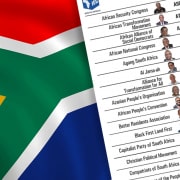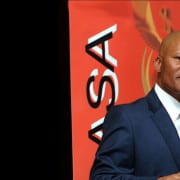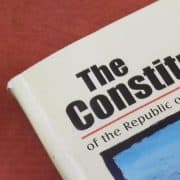|
Getting your Trinity Audio player ready...
|
Today the Constitutional Court (ConCourt) handed down judgment in the political party funding-related matter of My Vote Counts (MVC) vs the president of South Africa, the minister of justice, and others. The court ruled that voters have the right to be informed about the sources of the private funding of political parties.
In delivering today’s judgment, which followed on the March 2018 hearing to confirm an order of constitutional invalidity, Chief Justice Mogoeng Mogoeng said that it is the primary duty of the state to provide voters with information that will enhance the enjoyment of fundamental rights.
Mogoeng wrote the judgment, while judges Zondo, Khampepe, Jafta, Madlanga, and Theron, and acting judges Dlodlo, Goliath and Petse concurred unreservedly.
“Information on private funding of political parties and independent candidates must be reasonably accessible,” Mogoeng said. “The order of constitutional invalidity is confirmed in the following terms: Information on political party funding is necessary for effective exercise of the right to vote. Party funding information must be recorded, preserved and made easily available.”
Furthermore, any information regarding the private funding of independent candidates or political parties cannot be withheld, undisclosed, unrecorded, or destroyed at the discretion of the holder.
“Political parties and candidates cannot pick and choose what must be disclosed for the public to have the necessary information at hand to exercise their right to vote effectively,” Mogoeng said. This would also help in the fight against corruption, he said, because corruption may arise when voters do not know who funds a party.
The judgment orders Parliament to amend PAIA to include access to political party funding information – Parliament has been given 18 months to accomplish this by any appropriate means.
With national elections coming up in 2019, voters may not be optimistic about the PAIA amendments being finalised before they go to the polls, but Parliament can achieve this goal with the appropriate focus and motivation, said Corruption Watch’s head of legal and investigations, Leanne Govindsamy.
MVC’s costs are to be paid by the Department of Justice.
Fighting for transparency
Since 2012, MVC has fought for transparency in party funding. The organisation is concerned that there is no legislation that compels political parties to publicly disclose private donations or that regulates their private funding.
MVC suffered a setback in September 2016 when the ConCourt ruled against its bid to compel political parties to publicly disclose where their private funding comes from. At that time the majority judgment held that while the public does have the right to know who funds political parties, MVC should have challenged the failure of the Promotion of Access to Information Act (PAIA) to allow for the on-going release of party funding information.
MVC acted upon the ConCourt’s view, and appeared before the Western Cape High Court in 2017 to argue that PAIA is unconstitutional, because it does not compel political parties to provide information on their private donations. In September 2017 the High Court found in favour of MVC in the matter, holding that PAIA is inconsistent with the Constitution on that point. It gave Parliament 18 months to amend the relevant legislation.
At the time Judge Yasmin Meer declared that information about the private funding of political parties and independent ward candidates, who are registered for elections, is “reasonably required for the effective exercise of the right to vote in such elections and to make political choices.”
CW makes submissions on political party funding
In a parallel but separate matter, on 20 June 2018 Corruption Watch (CW) made a submission before the parliamentary Ad Hoc Committee on the Funding of Political Parties, on the draft political party funding bill.
The organisation centred its submission on a number of points:
- The definition of foreign persons – this accounts for individuals, locally registered companies, and trust, but does not make provision for companies which are registered in South Africa and whose major shareholder is a foreign entity. This has a bearing on the issue of beneficial ownership, CW said.
- CW expressed its concern about the non-regulation of funding from companies that do business with the state as well as funding from investment vehicles owned by political parties – it suggested that the requisite amendments be included to address these vital issues. This does not necessarily involve complete bans but detailed and specific regulation so as to avoid abuse.
- The organisation also highlighted clause 9(3)(a), which provides for a donation to a political party or a member of a political party by a foreign entity, for the purpose of policy development of a political party. CW said the uncertainty in this clause as to what is meant by policy development allows for precisely the type of influence by foreign interests over the policies of local political parties that must be prevented.
“We hope that the ConCourt’s judgment will give the National Assembly and the National Council of Provinces the impetus to push the party funding bill through before next year’s general elections,” said CW’s Govindsamy, who was in Parliament to present the submission. “We are almost there – if the regulations are in place, fine-tuning can happen afterwards.”
CW again emphasised the importance and usefulness of the OECD Framework on Financing Democracy and Supporting Better Public Policies and Averting Policy Capture, in the reform of party political finance. The organisation pointed out that in the OECD Framework, there are reports of a correlation between campaign spending and performance in elections. The allocation to a particular legislature must be divided equally among the represented political parties in each of those legislatures, CW said, because the allocation of funds to political parties is important for levelling the playing field and encouraging competitive electioneering.
The risk of having allocation of funds distributed according to votes or share of seats in past elections hinders smaller parties (with less access to funds) from contesting with the bigger parties in a meaningful way.








